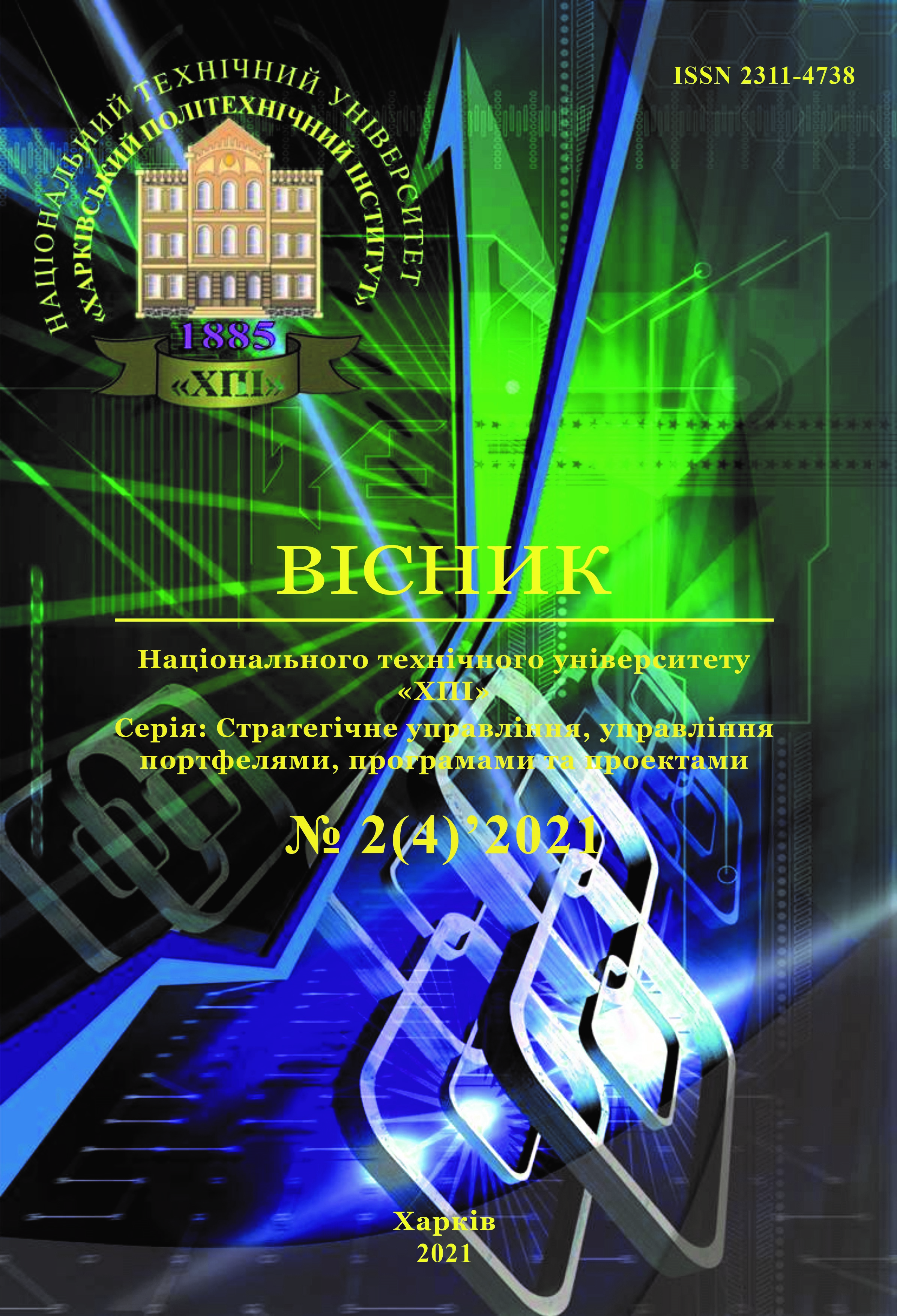CONCEPTUAL PROCEDURE FOR ESTIMATING THE PERFORMANCE PROJECT BASED ON FLEXIBLE SCRUM METHODOLOGIES IN THE FIELD OF INFORMATION TECHNOLOGIES
DOI:
https://doi.org/10.20998/2413-3000.2021.4.8Keywords:
IT project, competence, efficiency, evaluation of efficiencyAbstract
The research and substantiation of the conceptual procedure of evaluation of efficiency of IT projects which are realized on the basis of application of flexible methodology of Scrum is offered. This procedure will increase the efficiency of the IT project, as well as reduce its implementation time. The substantiation and choice of the criterion for evaluating the effectiveness of the IT project, which takes into account the human factor, is presented. Evaluation is based on human resources research, namely the characteristics of project team members. Conceptually, the procedure for evaluating the effectiveness of an IT project is a complex multi-stage iterative process that requires consideration of the team implementation of IT project processes. The transparency of Scrum's general terms and standards of flexible methodology provides the possibility of the expected result. Therefore, continuous evaluation of performance at each stage of Scrum will increase productivity and help to identify deviations at an early stage, when they can be quickly eliminated or corrected. Based on this, we can identify the following main stages of evaluating the effectiveness of IT projects implemented in the flexible methodology of Scrum. An integrated indicator of project team competence was obtained, which provides opportunities to reconcile the company's IT goals and opportunities to reduce requirements, as well as the decision to continue research by expanding existing options or synthesis of new options with appropriate variation of indicators, weights, composition of elements. Conclusions are made about the possibility of applying the research in the development of an intelligent system for evaluating the effectiveness of the IT project based on determining the level of competence of project team members, which will reduce project implementation time and increase IT project efficiency.
References
Виленский В.П. Оценка эфективности инвестиционных проектов : теория и практика. М.: Дело , 2001. 832 с.
Москві С.О., Бевз С.М., Верба В.А., Дідик В.Г., Новиков В.А., Унковська Т.Є. Проектний аналіз. Київ: ТОВ „Видавництво Лібра”, 1998. – 368 с.
Новиков Д. А., Иващенко А.А. Модели и методы организационного управления инновационным развитием фирмы. М.: КомКнига, 2006. 332 с.
Руководство по управлению инновационными проектами и программами: т.1, версия 1.2 / пер.на рус.язык под ред. С.Д.Бушуева. К.: Наук.світ, 2009. 173 с.
Швандров В.А., Базилевич А. И.. Управление инвестиционными проектами : [монографія] : М.: ЮНИТИ – ДАНА, 2001. 208 с.
Прокопенко Т.О. Аналіз методів оцінки ефективності проектів і програм. Вісник ЧДТУ. 2012. №1. С.67 – 71.
Serrador, P. & Turner, R. (2015). The relationship between project success and project efficiency. Project Management Journal, 46(1), 30–39.
Матвеев А.А., Новиков Д.А., Цветков А.В. Модели и методы управления портфелями проектов. М.:ПМСОФТ, 2005. 206 с.
Maximini, Dominik. The Scrum Culture: Introducing Agile Methods in Organizations. Management for Professionals. Cham: Springer. January 8, 2015. Retrieved August 25, 2016. С. 26. ISSN 978331911827
Novikov D. Control Methodology. New York: Nova Science Publishers, 2013. 76 p. ISBN 978-1624179624.
Юдицкий С. А., Владиславлев П. Н. Основы предпроектного анализа организационных систем. М.: Финансы и статистика, 2005. 144 с.
Прокопенко Т.О. Деякі аспекти фінансово-економічної оцінки ефективності проектів та програм. Восточно-европейский журнал передовых технологий. 2012. №1/12(55). С.28 – 30.
Пересада А.А., Майорова Т.В. Проектное финансирование / под ред. А.А. Пересады. К.: КНЕУ, 2007. 767 с.
Мазур И. И., Шапиро В. Д., Ольдерогге Н. Г. Оценка эффективности инвестиционных проектов. Управление проектами : учебное пособие / под ред. И. И. Мазура. 2-е изд. Москва, 2004. С. 312–344.
Бушуев С. Д. и др Креативные технологии управления проектами и программами : [монография] / Укр. ассоц. упр. Проектами / под ред. С. Д. Бушуева. Київ : Саммит-книга, 2010. 768 с.
Прокопенко Т.О., Ладанюк А.П. Інформаційні технології управління організаційно-технологічними системами: монографія. Черкаси: Вертикаль, видавець Кандич С.Г., 2015. 224 с.
Прокопенко Т. О., Ободовский Б. П. Дослідження впливу компетентностей членів проєктної команди на ефективність проєкту в галузі інформаційних технологій. Вісник Національного технічного університету «ХПІ». Серія: Стратегічне управління, управління портфелями, програмами та проектами. 2020. № 2, ст. 50-55
Лега Ю.Г., Данченко О.Б. Експертні процедури та методи прийняття рішень в інвестиційних проектах. Вісник ЧДТУ. 2010. №2. С.69 – 73
Прокопенко Т.О. Формування системи показників оцінки ефективності інвестиційних проектів і програм. Вісник ЧДТУ. 2012. №2. С. 58 – 62.
Downloads
Published
Issue
Section
License

This work is licensed under a Creative Commons Attribution-NonCommercial-ShareAlike 4.0 International License.
Our journal abides by the Creative Commons copyright rights and permissions for open access journals.
Authors who publish with this journal agree to the following terms:
Authors hold the copyright without restrictions and grant the journal right of first publication with the work simultaneously licensed under a Creative Commons Attribution-NonCommercial-ShareAlike 4.0 International License (CC BY-NC-SA 4.0) that allows others to share the work with an acknowledgement of the work's authorship and initial publication in this journal.
Authors are able to enter into separate, additional contractual arrangements for the non-commercial and non-exclusive distribution of the journal's published version of the work (e.g., post it to an institutional repository or publish it in a book), with an acknowledgement of its initial publication in this journal.
Authors are permitted and encouraged to post their published work online (e.g., in institutional repositories or on their website) as it can lead to productive exchanges, as well as earlier and greater citation of published work.

